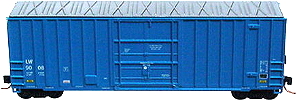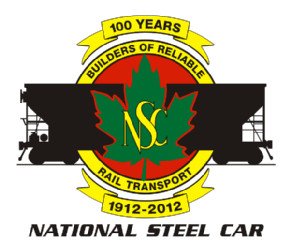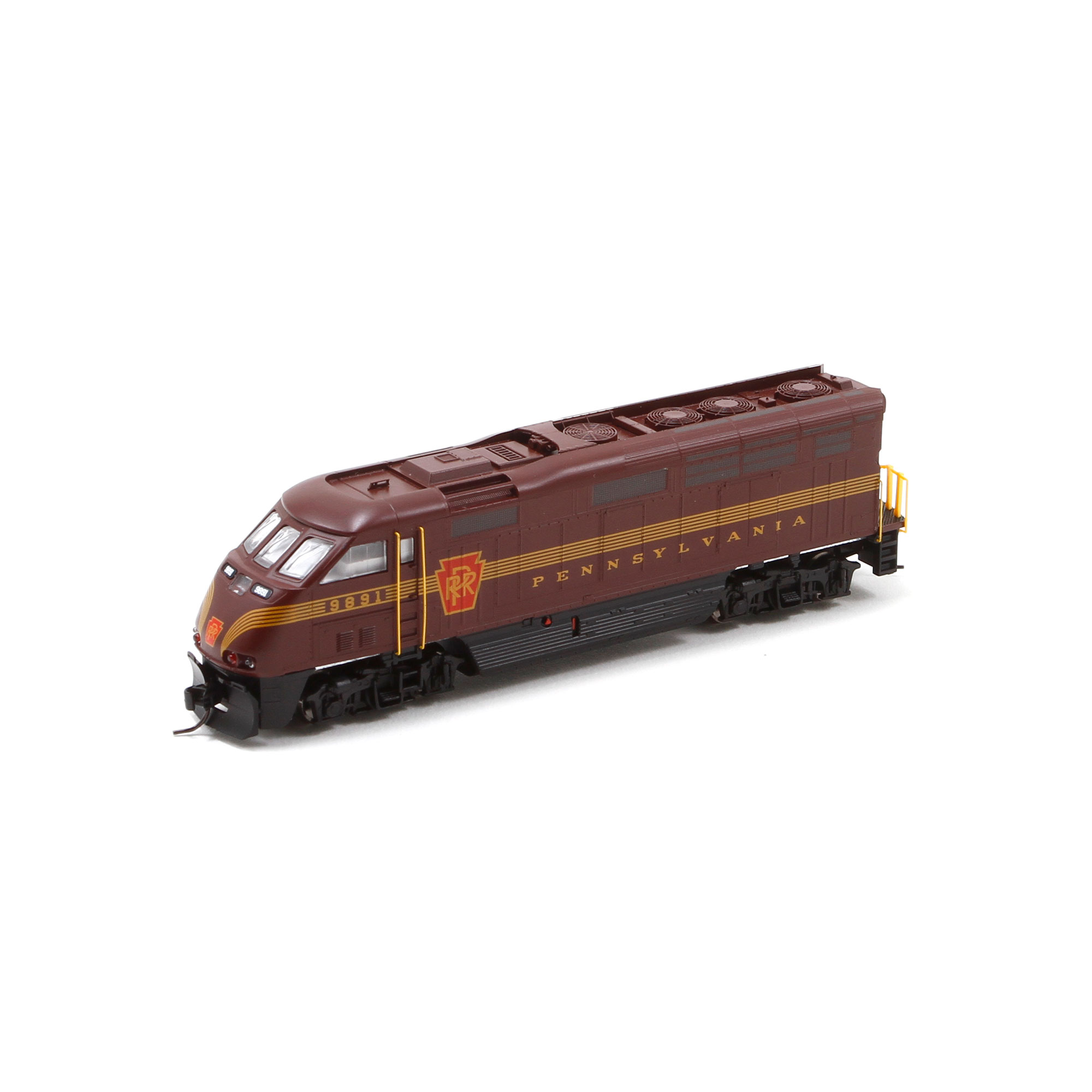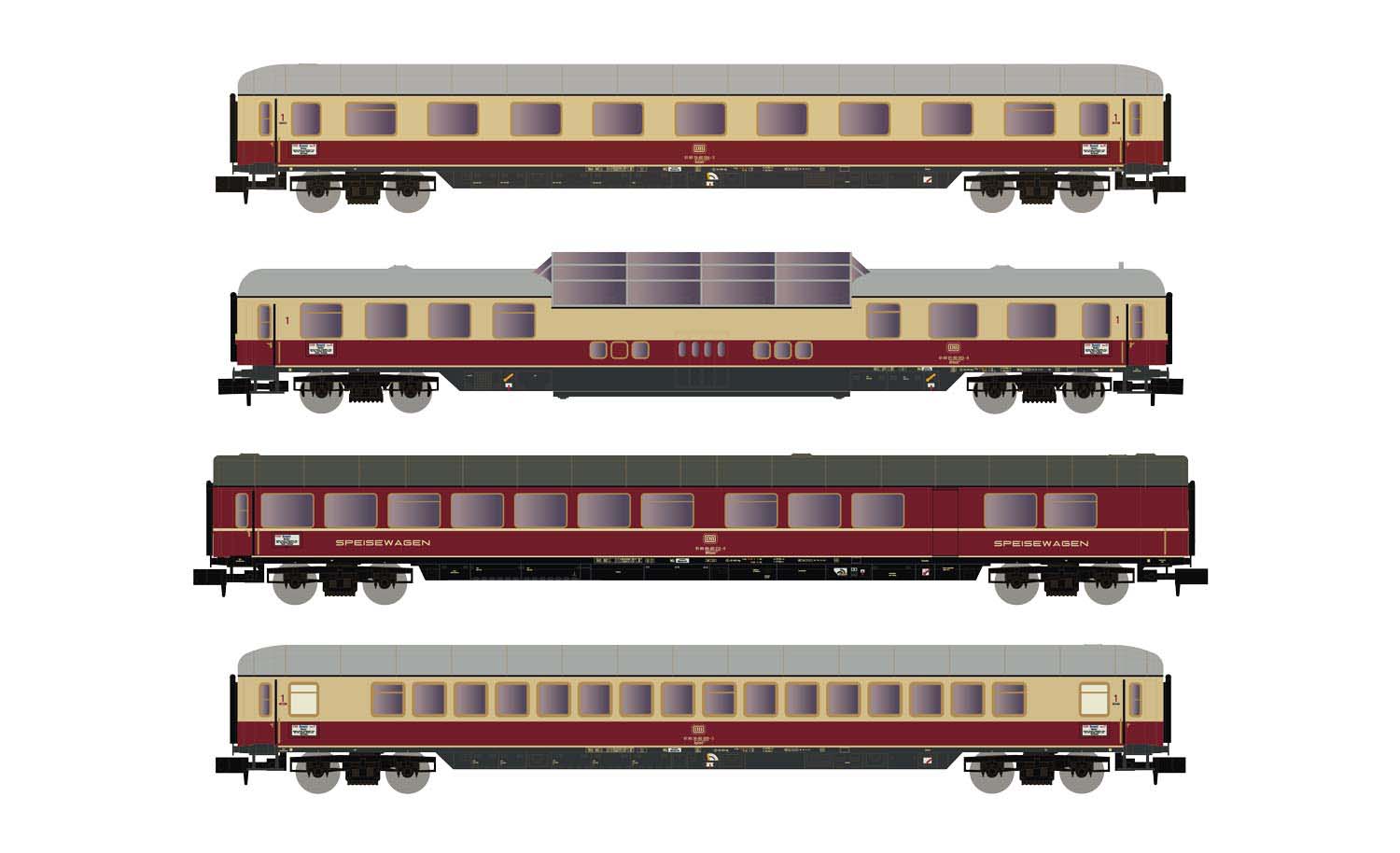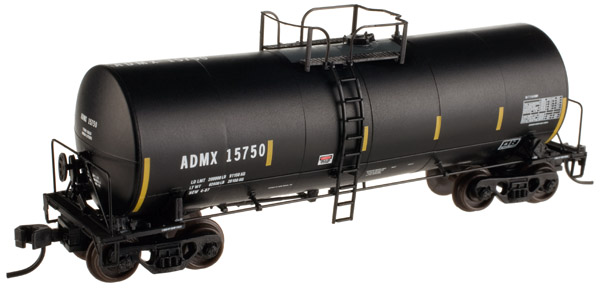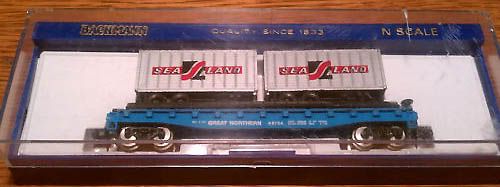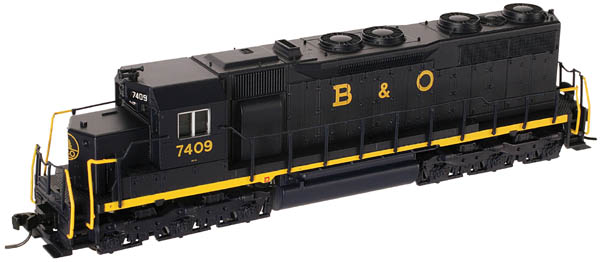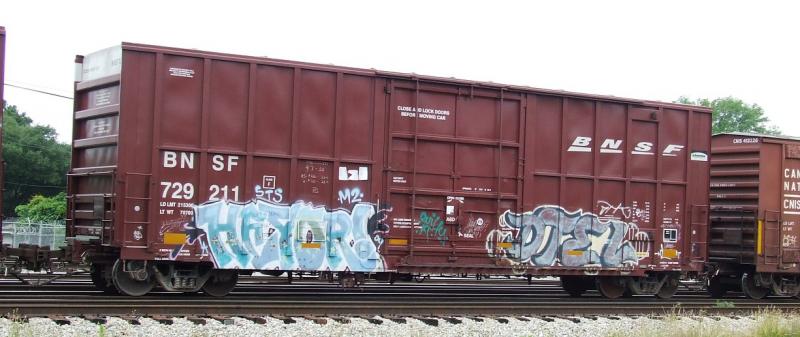LBF Company - 5519 - Boxcar, 50 Foot, Steel, Hi-Cube - National Steel Car - 12 Different Available
| Stock Number | 5519 |
| Original Retail Price | $17.95 |
| Brand | LBF Company |
| Manufacturer | LBF Company |
| Body Style | E&C Boxcar Gunderson Hi-Cube |
| Prototype Vehicle | Boxcar, 50 Foot, Steel, Hi-Cube (Details) |
| Road or Company Name | National Steel Car (Details) |
| Reporting Marks | LW |
| Road or Reporting Number | 12 Different Available |
| Paint Color(s) | Blue with Aluminum Roof |
| Print Color(s) | White |
| Coupler Type | MT Magne-Matic Knuckle |
| Wheel Type | Injection Molded Plastic |
| Wheel Profile | Small Flange (Low Profile) |
| Item Category | Rolling Stock (Freight) |
| Model Type | Boxcar |
| Model Subtype | 50 Foot |
| Model Variety | Gunderson Hi-Cube |
| Prototype Region | North America |
| Prototype Era | NA Era IV: 2nd Gen Diesel (1958 - 1978) |
| Scale | 1/160 |
Specific Item Information:
LBF has done a superb job on their latest N Scale body style. Cars come factory equipped with Micro-Trains® trucks/couplers. Cars are ready-to-run, fully assembled. Each road name is available in 12 unique road #s.
Model Information:
This model was first created by E&C shops. The tooling was sold to the LBF Company and in turn when they went out of business in 2009, the model was passed on to Hubert's Model RR Mfg Group. They are available in both single and double door varieties.
Prototype History:
While the 40-foot boxcar was a standard design, and it did come in different setups depending on the type of freight being transported, it was not large enough for efficient mass commodity transportation. The 50-foot boxcar made its first appearance in the 1930s and steadily grew in popularity over the years, which further improved redundancies by allowing for even more space within a given car. Today, the 50-footer remains the common boxcar size. After the second world war ended, and steel became once again readily available, steel became the go-to choice for construction of boxcars. Pullman Standard and ACF were some of the most prolific builders of these cars.
In the 1960s, the flush, "plug" style sliding door was introduced as an option that provides a larger door to ease loading and unloading of certain commodities. The tight-fitting doors are better insulated and allow a car's interior to be maintained at a more even temperature.
The 50 foot hi-cube boxcar fleet is similar to a 50 foot standard car with an additional 2 feet of interior height. This is known as a "Plate F" boxcar. 50 foot Hi-Cube boxcars typically have a load capacity of 100 tons and are equipped with cushion underframes and plug doors. These cars are used primarily in rolled paper service as the extra height is needed to accommodate the larger rolls that are now commonplace. They can also be used for similar commodities handled in other 50’ or 60’ boxcars.
In the 1960s, the flush, "plug" style sliding door was introduced as an option that provides a larger door to ease loading and unloading of certain commodities. The tight-fitting doors are better insulated and allow a car's interior to be maintained at a more even temperature.
The 50 foot hi-cube boxcar fleet is similar to a 50 foot standard car with an additional 2 feet of interior height. This is known as a "Plate F" boxcar. 50 foot Hi-Cube boxcars typically have a load capacity of 100 tons and are equipped with cushion underframes and plug doors. These cars are used primarily in rolled paper service as the extra height is needed to accommodate the larger rolls that are now commonplace. They can also be used for similar commodities handled in other 50’ or 60’ boxcars.
Road Name History:
Founded in 1912 by several investors led by Sir John Morison Gibson and with interests related to the Magor Car Corporation, Basil Magor was enlisted to lead the National Steel Car project. Once the new plant was functioning in Hamilton, Ontario, Magor became General Manager of National Steel Car Company Limited. The first few years of National Steel Car's production surpassed the expectations of its investors. The company began manufacturing just as Canadian rolling stock orders reached an all-time high in 1913. Due to the company's impeccable timing, National Steel Car began business with a large number of box car orders from Canadian Pacific Railway, and various railcar orders from Canadian Northern Railway. In 1919, Donald Symington of Baltimore and Robert Magor of Magor Car Corp. made an offer on the company, and from there on it was reorganized as National Steel Car Corporation Limited.
Business at National Steel Car boomed from the beginning of its life until just before the depression period of the 1930s. During the depression, National Steel Car was falling behind in terms of diversity in comparison to its competitors, and suffered a severe lack of orders. At one point the company resorted to producing motor trucks, bus bodies, and outboard motor boats, just so they had orders to fill. World War II renewed National Steel Car's business, and the company has been in a relatively healthy state for most of its life since. It shares nearly all Canadian rolling stock orders with Eastern Car Company. National Steel Car also exports to the United States regularly, more so in the later years of its life.
From Wikipedia In 1962, Dofasco bought National Steel Car, but by 1990 it had effectively given up control of the declining company, and in 1994 they sold it to Hamilton corporation National Industries Inc., owned by Greg Aziz. By the year 2000, Aziz had increased National Steel Car's workforce from 500 to 3,000 employees, and its production capacity from 3,500 to 12,500 rail cars annually. Today, National Steel Car makes and supplies various rolling stock to Canadian and American customers, mainly railway operators and commercial rail operators.
Business at National Steel Car boomed from the beginning of its life until just before the depression period of the 1930s. During the depression, National Steel Car was falling behind in terms of diversity in comparison to its competitors, and suffered a severe lack of orders. At one point the company resorted to producing motor trucks, bus bodies, and outboard motor boats, just so they had orders to fill. World War II renewed National Steel Car's business, and the company has been in a relatively healthy state for most of its life since. It shares nearly all Canadian rolling stock orders with Eastern Car Company. National Steel Car also exports to the United States regularly, more so in the later years of its life.
From Wikipedia In 1962, Dofasco bought National Steel Car, but by 1990 it had effectively given up control of the declining company, and in 1994 they sold it to Hamilton corporation National Industries Inc., owned by Greg Aziz. By the year 2000, Aziz had increased National Steel Car's workforce from 500 to 3,000 employees, and its production capacity from 3,500 to 12,500 rail cars annually. Today, National Steel Car makes and supplies various rolling stock to Canadian and American customers, mainly railway operators and commercial rail operators.
Brand/Importer Information:
 The LBF company was based in Roseburg Oregon founded by Fred Becker. LBF was the successor company to E&C Shops, also founded by Becker. LBF also did business under the name USA Plastics. USA Plastics/LBF opened for business in 1993. They produced N Scale models using toolings purchased from the E&C Company. Later, in 1998, LBF folded and the toolings were sold to Hubert's Model RR Manufacturing group which was also located in Roseburg. Hubert had been one of Becker's partners in LBF/USA Plastics. Later, when Hubert's operation folded, the toolings were acquired by InterMountain.
The LBF company was based in Roseburg Oregon founded by Fred Becker. LBF was the successor company to E&C Shops, also founded by Becker. LBF also did business under the name USA Plastics. USA Plastics/LBF opened for business in 1993. They produced N Scale models using toolings purchased from the E&C Company. Later, in 1998, LBF folded and the toolings were sold to Hubert's Model RR Manufacturing group which was also located in Roseburg. Hubert had been one of Becker's partners in LBF/USA Plastics. Later, when Hubert's operation folded, the toolings were acquired by InterMountain.

Item created by: CNW400
on 2020-07-07 09:45:23
If you see errors or missing data in this entry, please feel free to log in and edit it. Anyone with a Gmail account can log in instantly.
If you see errors or missing data in this entry, please feel free to log in and edit it. Anyone with a Gmail account can log in instantly.


